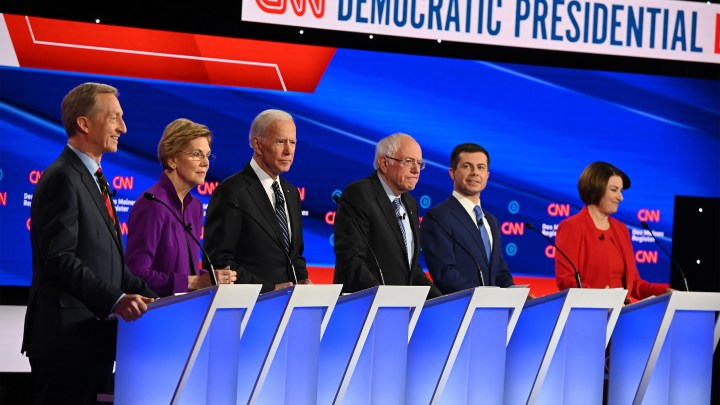
Some Democrats don’t want corporate money. That’s not stopping corporations.
Some Democrats don’t want corporate money. That’s not stopping corporations.

Democratic candidates have been swearing off corporate money, even returning some donations, but it is still flowing into the Democratic primary.
When candidates say they won’t take corporate donations, they’re usually talking about avoiding money from a company’s political action committee or PAC. That money is easy to trace.
“But PAC money is only one piece of the larger puzzle,” sad Zhao Li, who researches political contributions at Princeton. “Employees and corporate executives and even shareholders can make direct contributions to candidates that [don’t] have anything to do with a PAC.”
Those kinds of donations are much tougher to track. Groups of employees can always get together and coordinate their donations, and with millions of individual donors in this race, it’s difficult for candidates to figure out that money’s origin.
“It’s hard to say, ‘I’m not going to take money from individuals if they happen to work for corporations,’ right?” Li said.
Another way corporate money is seeping into the 2020 race: industry and trade groups. Constance Bagley, a lawyer who advises businesses on their political donations, says it’s safer to give to causes rather than campaigns, but some clients insist.
“If you’re going to play this game, first of all, be transparent,” Bagley said.
“Second of all, if at all possible, get buy-in from your shareholders.”
If businesses just want to get their messages across, they can always buy ads. Those political budgets won’t go to waste, after all. “Corporations are responding to the old adage of, ‘If you’re not at the table, you’re on the menu,'” Bagley said.
And the tables aren’t just in the White House. Bruce Freed runs the Center for Political Accountability, which tracks corporate money in politics. He said companies tend to spend much more at the state and local level than in D.C. “They’ll work through third party groups like the Republican or Democratic governors associations, or the legislative campaign committees,” Freed said.
Even if some democratic candidates don’t want that money, the Democratic party sure does.
However, there is a risk for businesses getting heavily involved in a political campaign. “Companies face an environment where they have to really be very, very careful about their political spending and what it associates them with,” Freed said. Social media sleuths are quick to point out any perceived conflict between a corporation’s public position and its political contributions.
There’s a lot happening in the world. Through it all, Marketplace is here for you.
You rely on Marketplace to break down the world’s events and tell you how it affects you in a fact-based, approachable way. We rely on your financial support to keep making that possible.
Your donation today powers the independent journalism that you rely on. For just $5/month, you can help sustain Marketplace so we can keep reporting on the things that matter to you.


















